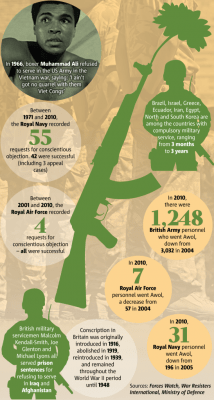Fox urged to uphold conscientious objection in Armed Forces Bill
Defence Secretary Liam Fox is being urged to uphold the right of armed forces personnel to be given a discharge if they develop a conscientious objection.
The call comes as Fox presents the Armed Forces Bill to the House of Commons today. Forces Watch, a network concerned with ethical issues around the armed forces, says that the Bill is an opportunity for politicians to demonstrate their commitment to the human rights of forces personnel.
They add that the process of declaring a conscientious objection must be brought “out of obscurity”.
In theory, the law grants troops the right to apply for discharge if they develop a conscientious objection. But Forces Watch pointed to evidence that many personnel are unaware of this right and that the procedures for applying for it are unclear and poorly publicised.
The issue came to the fore last month, when Michael Lyons, a medical worker in the navy found that he could no longer participate in the war in Afghanistan after becoming aware of what was happening there.
His application for conscientious objection was turned down and he only discovered he had the right to appeal by consulting At Ease, an organisation which advises serving personnel.
Lyons gave a strong defence of his position at a hearing of the Advisory Committee on Conscientious Objection (ACCO) last month. Despite this, ACCO has advised Liam Fox to refuse to discharge Lyons and a final decision from the Defence Secretary is awaited.
“Respect for conscience is the hallmark of a democratic society,” said Emma Sangster of Forces Watch, “Members of the armed forces see and experience things unimaginable to most of us and it is no surprise that this can alter their beliefs”.
She insisted that, “Parliament can ensure, through the Armed Forces Bill, that the right to conscientious objection is mentioned when new recruits sign up, that information about it is readily available and that those who apply for discharge are taken seriously”.
Currently no mention of the right to conscientious objection is made in the “Notice Paper” – the contract that new recruits sign on joining the forces.
“We know that many serving members of the armed forces have objected to recent conflicts on moral grounds,” said Sangster, highlighting evidence of deserters and others who said that they had ethical worries about the warfare they were engaged in.
But she added that, prior to last month, ACCO had not met for fourteen years, indicating “just how difficult it is for conscientious objectors to find their way through this very opaque process and to have their beliefs respected”.
Forces Watch say that the Armed Forces Bill should also reduce the minimum length of service. This currently stands at between three and six years, depending on the age of the recruit and the branch of the forces involved. Sixteen-year-olds joining the army are obliged to serve until their twenty-second birthday.
Groups including the Coalition to Stop the Use of Child Soldiers, the Children’s Society, War Child, Quaker Peace & Social Witness and Forces Watch have urged Parliament to raise the minimum age of recruitment from sixteen to eighteen.
The UK is the only country in Europe to recruit sixteen-year-olds into the forces, and is one of fewer than twenty in the world. The others include North Korea and Zimbabwe.
See more: conscientious objection, Michael Lyons
Bringing it up to date: 100 years on from the First World War
This article, summarising ForcesWatch work, was first published on the White Feather Diaries website.







